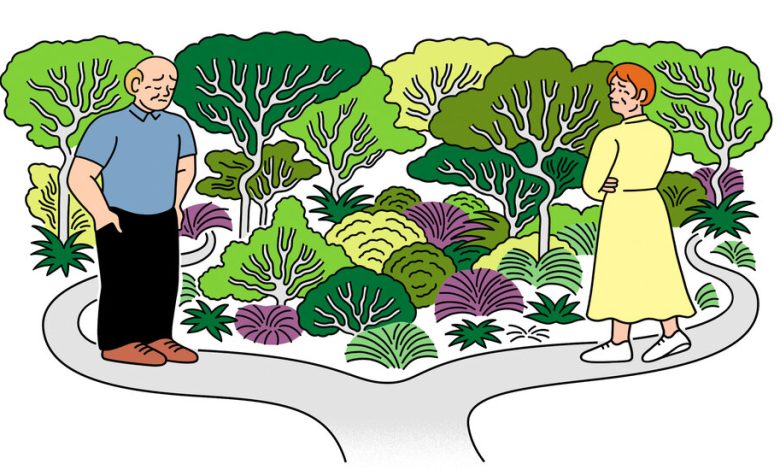I Think My Husband Has Dementia. Can I Leave Him Before It Worsens?

I strongly suspect that my husband is developing dementia. His doctors have found nothing wrong with him. I understand that ‘‘mini’’ cognition tests might not find anything amiss in the early stages of disease, and I imagine that what are now subtle changes will eventually become obvious. In the meantime, our decades-long relationship has eroded. My insistence that he engage with me in maintaining a quality relationship has led to endless fighting and brought me to the brink of divorce.
Since I’ve come to understand that early-stage dementia is at the root of our problems, I’ve quit trying to ‘‘fix’’ our relationship. Our fighting has stopped, but it’s a lonely place to be. I’m not thrilled about spending my retirement years as a caregiver. It’s a huge sacrifice that will narrow my own life significantly. Do we both need to go down with the ship? Can I leave now (and let his family deal with this)? Or am I obligated to stay and care for him? — Name Withheld
From the Ethicist:
The traditional Christian marriage vow was to stay together ‘‘in sickness and in health.’’ The possibility of divorce shifts the meaning of that promise — it becomes more of an ethical commitment than a contractual obligation. In a loving relationship, you support your spouse through hard times, including illness and decline, because you can’t easily imagine doing otherwise. The shared experiences and memories of a life together enable you to find warmth amid cold spells. Though every case is different, age-related dementia can erode people’s capacities without effacing the essence of their personality and character.
You talk about how your husband has changed; it’s also possible that you’ve changed. If medical professionals haven’t diagnosed dementia, it’s worth considering that your personal assessment could be mistaken. Either way, it sounds as if your worry isn’t so much that you’ll become a caregiver as that you won’t have a loving relationship with the person you would be caring for. Before you sever ties, though, I would encourage you to explore couples counseling attuned to the challenges of dementia. See if you can cultivate your own well-being while finding activities that play to your husband’s strengths. You should be able to grieve what is being lost and acknowledge whatever moments of resentment you feel without shame.
I’m not saying that you’re required to sacrifice your well-being to his. The special obligations we have to our loved ones are rooted in the value we place on our relationships with them, with all the resilience, and fragility, of those relationships. Still, I hope you’ll figure out a way to balance your needs with your husband’s. That doesn’t mean going down with the ship; it means trying to find a way to keep the ship afloat.
